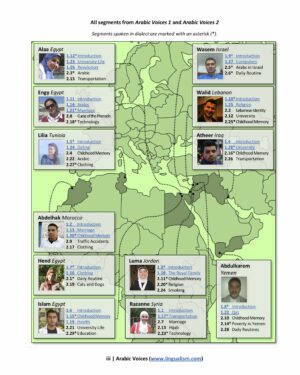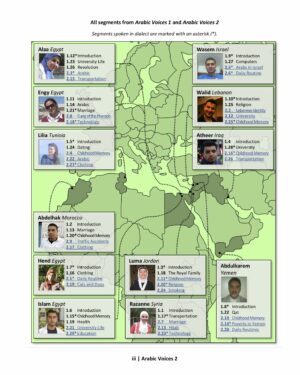☀️SUMMER SALE! 😎SAVE 10% for a limited time. Use coupon code LING10 at checkout. Sale ends July 31. (Offer excludes sale items, bundles, and store credit.)
Home » Modern Standard Arabic » Traffic Accidents–Abdelhak
Traffic Accidents–Abdelhak
| Greetings and welcome! [00:00.3] | السلام عليكم ورحمة الله وبركاته، أهلًا ومرحبًا بكم. | |
| Today, we will talk about what Abdelhak said about traffic accidents in Morocco—may God protect us and you from the worst of accidents. [00:04.8] | اليوم سنتحدّث عمّا قاله عبد الحق بشأن حوادث المرور في المغرب—كفانا الله وإيّاكم شر الحوادث. | |
| We start on page 49, specifically on line 1—Abdelhak says, "Morocco is considered [to be] one the countries that knows the rates of many traffic accidents." [00:14.8] | نبدأ في الصفحة التاسعة والأربعون، وتحديدًا في السطر الأول—يقول عبد الحق: (يُعتبر المغرب واحدًا من الدول التي تعرف نسب حوادث سير كثيرة). | |
| Abdelhak here uses the verb … here, the verb يُعتبر [is considered], and this verb, we often use in the passive form, or we often use in the passive form. [00:30.6] | ويستخدم عبد الحق هنا الفعل… الف… هنا الفعل [يُعتبر]، والفعل [يُعتبر] غالبًا ما نستخدمه في صيغة المبني للمجهول، أو كثيرًا ما نستخدمه في صيغة المبني للمجهول. | |
| We have explained the passive voice in the previous video, so you can refer to the previous video, and learn about the passive voice. [00:45.0] | وكنا قد شرحنا صيغة المبني للمجهول في الفيديو السابق، يمكنك الرجوع إلى الفيديو السابق، والتعرف على صيغة المبني للمجهول. | |
| Here he says, "Morocco is considered one of the countries..." in the passive form, there is no subject here. "Morocco is considered one of the countries..." [00:54.5] | هنا يقول: (يُعتبر المغرب واحدًا من الدول) ب… في صيغة المبني للمجهول، فلا يوجد فاعل هاهنا، (يُعتبر المغرب واحدًا من الدول). | |
| For example, you could say, "Japan is one of the most advanced countries in the technology industry," and so on. [01:08.4] | يمكنك أن تقول مثلًا: (تُعتبر اليابان من أكثر الدول تقدمًا في صناعة التكنولوجيا)، وهكذا. | |
| We often use the verb يُعتبر (is considered) in the passive form. [01:16.6] | غالبًا ما نستخدم الفعل [يُعتبر] في صيغة المبنىُّ المبنيِّ للمجهول. | |
| Great! Then we move on to line 2. Abdelhak says, "I think that hardly a day passes without the media and newspapers informing us about the presence of fatal traffic accidents in various cities of Morocco." [01:23.3] | عظيم! ننتقل بعد ذلك إلى السطر الثاني—ويقول عبد الحق: (أعتقد أنه لا يكاد يمرّ يوم دون أن تطلعنا وسائل الإعلام والجرائد عن وجود حوادث سير مميتة بمختلف مدن المغرب). | |
| Abdelhak begins his talk by stating his opinion, and he uses the verb يعتقد (believes) for that, so he says: أعتقد أن]. [01:40.9] | ويبدأ عبد الحق حديثه بذكر رأيه، ويستخدم لذلك الفعل [يعتقد]، فيقول: [أعتقد أن]. | |
| And when we use the verb يعتقد, or أعتقد (I think), we often affix it with أن (that): "I think there's a bug; I think there's a bug; I think this book is the best," and so on. [01:52.4] | وعند استخدام الفعل [يعتقد]، أو [أعتقد] غالبًا ما نلحقه [بأن]، (أعتقد أن هناك خلل، أعتقد أن هناك خطأ، أعتقد أن هذا الكتاب هو الأفضل)، وهكذا. | |
| When you use the verb أعتقد followed by أن, "I think that this is correct." [02:07.9] | فعندما تستخدم الفعل [أعتقد] تليه [بأن]، (أعتقد أن هذا هو الصحيح). | |
| Great! We… Sorry… We then move on to line 3, where Abdelhak says, "I think that the annual rate is not less than four thousand deaths per year." [02:17.8] | عظيم! نن… عفوًا… ننتقل بعد ذلك إلى السطر الثالث، حيث يقول عبد الحق: (أظنّ أنه لا يقل المعدل السنوي عن أربعة آلاف قتيل سنويًا). | |
| He says, "I think that the annual rate is not less than," so he uses لا يقل (not less), [02:36.1] | يقول: (أظنّ أنه لا يقل المعدل السنوي عن)، فيستخدم [لا يقل]، | |
| And then when the number is mentioned… before the number is mentioned, عن is used, and this is how you can use the formula لا يقل عن (not less than). [02:43.0] | وبعد ذلك عند ذكر الرقم… قبل ذكر الرقم يستخدم [عن]، وهذه هي الطريقة التي يمكنك أن تستخدم فيها صيغة [لا يقل عن]. | |
| You can say, "My income… my monthly income is not less than three thousand pounds." لا يقل عن. So you use لا يقل, and you use عن before mentioning the number… before mentioning the number. [02:54.7] | يمكنك أن تقول: (إن دخلي… إن دخلي الشهري لا يقل عن ثلاثة آلاف جنيه)، [لا يقل عن] فتستخدم [لا يقل]، وتستخدم [عن] قبل ذكر الرقم… قبل ذكر الرقم. | |
| The opposite of this formula is لا يتعدى (does not exceed), and this is the maximum, so you say, for example, "My monthly income does not exceed six thousand pounds." [03:11.9] | ومضاد هذه الصيغة هي [لا يتعدى]، وهذا هو الحد الأقصى، فتقول مثلًا: (إن دخلي الشهري لا يتعدى ستة آلاف جنيه). | |
| Not less than three thousand pounds, and not more than six thousand pounds. [03:25.1] | فلا يقل عن ثلاثة آلاف جنيه، ولا يتعدى ستة آلاف جنيه. | |
| As you can see when using لا يقل, we use عن, but when using لا يتعدىو we do not use عن; 'does not exceed four' or 'does not exceed six thousand pounds' without using عن. 'It is not be less than,' and its opposite is 'it does not exceed.' [03:29.9] | وكما ترى عند استخدام [لا يقل] نستخدم [عن]، ولكن عند استخدام [لا يتعدى] لا نستخدم عن؛ (لا يتعدى أربعة) أو (لا يتعدى ستة آلاف جنيه) بدون استخدام عن، [فلا يقل ومضادها لا يتعدى]. | |
| Great! We then move on to line 7. "For example, excessive speed ranks first in the causes of traffic accidents." [03:49.7] | عظيم! ننتقل بعد ذلك إلى السطر السابع، (فعلى سبيل المثال، تحتل السرعة المفرطة المرتبة الأولى في أسباب حوادث السير). | |
| Here, Abdelhak gives an example, and to set an example he says فعلى سبيل المثال, and this is a method that you can use at the beginning of the conversation to give a proverb, so you say على سبيل المثال and it means مثلًا (for example). [04:03.1] | هنا يعطي عبد الحق مثالًا، ولضرب المثال يقول [فعلى سبيل المثال]، وهذه طريقة يمكنك أن تستخدمها في بداية الحديث لضرب المثل، فتقول [على سبيل المثال] وهي تعني [مثلًا]. | |
| For example, you can say, "There are many books for learning Arabic." For example there is the Arabic Voices book for learning Arabic." [04:18.1] | تقول مثلًا: (هناك كتب كثيرة لتعلم العربية) فعلى سبيل المثال هناك كتاب Arabic Voices لتعلم العربية. | |
| We then move to line 9, where Abdelhak says here—and uses a recurring form that he uses repeatedly, which is the word عدم, and uses it to negate. [04:27.8] | ننتقل بعد ذلك إلى السطر التاسع، حيث يقول عبد الحق هنا—ويستخدم صيغة متكررة يستخدمها بتكرار، وهي كلمة [عدم]، ويستخدمها للنفي— | |
| He says 'lack of pedestrian attention, unfamiliarity of drivers, disrespect of both pedestrians and drivers, disrespect of the stop sign,' and so on. [04:46.2] | فيقول (عدم انتباه الراجلين، وعدم إلمام السائقين، وعدم احترام كل من الراجلين والسائقين، عدم احترام علامة قف)، وهكذا. | |
| He uses this form, which is a form we use for the negation. [04:57.8] | فيستخدم هذه الصيغة وهي صيغة نستخدمها للنفي. | |
| And as you can see... if you check, you will see that عدم (lack of) is attached to a masdar... it is followed by a masdar. 'the lack of attention of the pedestrians.' [05:02.1] | وكما ترى إن دققت، ترى أن [عدم] يلحقها [المصدر]… يلحقها [المصدر]، (عدم انتباه الراجلين). | |
| The masdar must be used here, not a 'that' clause. The masdar must be used. 'the lack of attention of pedestrians, the unfamiliarity of the drivers,' and so on. [05:12.7] | ولا بدّ من استخدام المصدر الصريح هنا، وليس المصدر المؤول، لابدّ من استخدام المصدر الصريح (عدم انتباه الراجلين، عدم إلمام السائقين)، وهكذا. | |
| For example, you can say, "Unemployment is the result of not having enough job opportunities," for lack of work, we use the masdar here after the word عدم, which is a negation form. [05:25.7] | يمكنك أن تقول مثلًا: (البطالة هي نتيجة لعدم وجود فرص عمل كافية)، لعدم وجود فنستخدم [المصدر] هاهنا بعد كلمة [عدم]، وهي صيغة للنفي. | |
| We then move on to line 12. Abdelhak says, "The solution was to produce a traffic code that enacts an enactment… enacting injunctive penalties for violators." [05:41.7] | ننتقل بعد ذلك إلى السطر الثاني عشر—يقول عبد الحق: (فكان الحل هو إخراج مدونة للسير تقوم بسِن… بسَن عقوباتٍ زجريّة في حق المخالفين). | |
| Here, Abdelhak uses the adjective زجريّة (injunction) with the word عقوبات (penalties), which means that these penalties are very severe penalties; they are injunctive penalties, deterrent penalties. [05:56.4] | فهنا يستخدم عبد الحق صفة [زجريّة] مع كلمة [عقوبات]، وهي تعني أن هذه العقوبات هي عقوبات شديدة جدًا، تكون عقوبات زجريّة، عقوبات رادعة. | |
| You can say a deterrent or injunctive punishment, and this means that this punishment is very severe, and because it is severe, it would put an end to this problem or this crime. [06:12.2] | يمكنك أن تقول عقوبة رادعة أو عقوبة زجريّة، وهذا يعني أن هذه العقوبة هي شديدة جدًا، ولأنها شديدة من شأنها أن تضع حد لهذه المشكلة أو لهذا الجرم. | |
| You can say, for example, "Corruption must have injunctive penalties, corruption must have deterrent penalties," injunctive penalties, deterrent penalties; Anything very severe that would put an end to this corrupt act or to it… this crime. [06:30.4] | يمكنك أن تقول مثلًا: (لابدّ للفساد من عقوبات زجريّة، لابدّ للفساد من عقوبات رادعة)، عقوبات زجريّة، عقوبات رادعة؛ أي شديدة جدًا من شأنها أن تضع حد لهذا العمل الفاسد أو له… لهذه الجريمة. | |
| After that, Abdelhak uses another term on line 15, a term similar to a literary term that says, "Most… the dilemma of traffic accidents cannot be reduced overnight." [06:52.6] | بعد ذلك يستخدم عبد الحق في السطر الخامس عشر مصطلح آخر، وهو مصطلح أشبه بالمصطلح الأدبي يقول: (إن معض… إن معضلة حوادث السير لا يمكن الحد منها بين عشيةٍ وضحاها). | |
| This is a literary term, you can use when you speak Standard Arabic, and you want to use a rhetorical word or a rhetorical phrase that says بين عشية وضحاها (overnight), which means that nothing will happen in a short time. [07:10.5] | وهذا مصطلح أدبي، يمكنك أن تستخدمه عندما تتحدّث العربية الفصحى، وتريد أن تستخدم كلمة بلاغية أو عبارة بلاغية تقول [بين عشية وضحاها]، وهذه تعني أن أمرًا لن يحدث في وقت قصير. | |
| For example, you can say, "We cannot improve economically overnight," meaning that this will not happen in a short time, but rather it will take time, and it will take a period. "The change is not possible overnight." [07:31.3] | تقول مثلًا: (لا يمكننا التحسن اقتصاديًا بين عشيةٍ وضحاها) أي أن هذا لن يحدث في وقت قصير، بل سيأخذ وقتًا وسيأخذ مدة (لا يمكننا التغيير بين عشيةٍ وضحاها). | |
| Great! We then move on to line 16—and Abdelhak says, "But a national debate must be held in order to study this...this problem, in order to find possible solutions." [07:48.7] | عظيم! ننتقل بعد ذلك إلى السطر السادس عشر—ويقول عبد الحق: (وإنما يجب القيام بمناظرة وطنية من أجل دراسة هذه… هذا المشكل، من أجل إيجاد الحلول الممكنة). | |
| He uses here من أجل (for) twice, to link between what he says and what he mentioned before, as he mentions the reason, the goal, or the end for which he is working. [08:04.1] | ويستخدمه هنا [من أجل] مرتين، للربط بين ما يقوله وما ذكره من قبل، فهو يذكر السبب أو الهدف أو الغاية التي يعمل من أجلها. | |
| He says, "a national debate must be held in order to study this problem," meaning that the reason for conducting a national debate is to study this problem. [08:16.8] | يقول (يجب القيام بمناظرة وطنية من أجل دراسة هذا المشكل)، أي أن السبب للقيام بمناظرة وطنية هو دراسة هذا المشكل. | |
| Remember...or use من أجل (for) to mention the goal. You can say, "study for success, or study to succeed" to mention the goal or to mention the aim. [08:31.4] | تذكر… أو تستخدم [من أجل] لذكر الهدف أو الغاية، يمكنك أن تقول: (أذاكر من أجل النجاح، أو أذاكر من أجل أن أنجح) لذكر الهدف أو لذكر الغاية. | |
| With this, we have finished commenting on what Abdelhak said. [08:46.4] | وبهذا نكون قد انتهينا من التعليق عمّا قاله عبد الحق. | |
| I hope you have benefited from the different words and terms that we have mentioned in the video. [08:51.2] | أتمنى أن تكونوا قد استفدتم من الكلمات والمصطلحات المختلفة التي قد ذكرناها في الفيديو. | |
| Thank you very much for your kind listening. May the peace, mercy and blessings of God be upon you. [08:58.8] | أشكركم شكرًا جزيلًا لحسن استماعكم، والسلام عليكم ورحمة الله وبركاته. |
Video Lessons
Arabic Voices MSA Lessons
Arabic teacher Mostafa Ahmed takes us through segments in MSA from Lingualism's book Arabic Voices 1: Authentic Listening and Reading Practice in Modern Standard Arabic and Colloquial Dialects, explaining interesting points of grammar and vocabulary.

Random Turkish B2 (Book 2)

Media Arabic Vocabulary 4

One Thousand and One Nights (Intermediate – Levantine Arabic)

One Thousand and One Nights (Elementary – Levantine Arabic)

Egyptian Arabic Verb Conjugation Drills: Anki Flashcards (Set 3)

Lebanese Arabic Verb Conjugation Drills: Anki Flashcards (Set 3)
© 2024 Lingualism LLC




